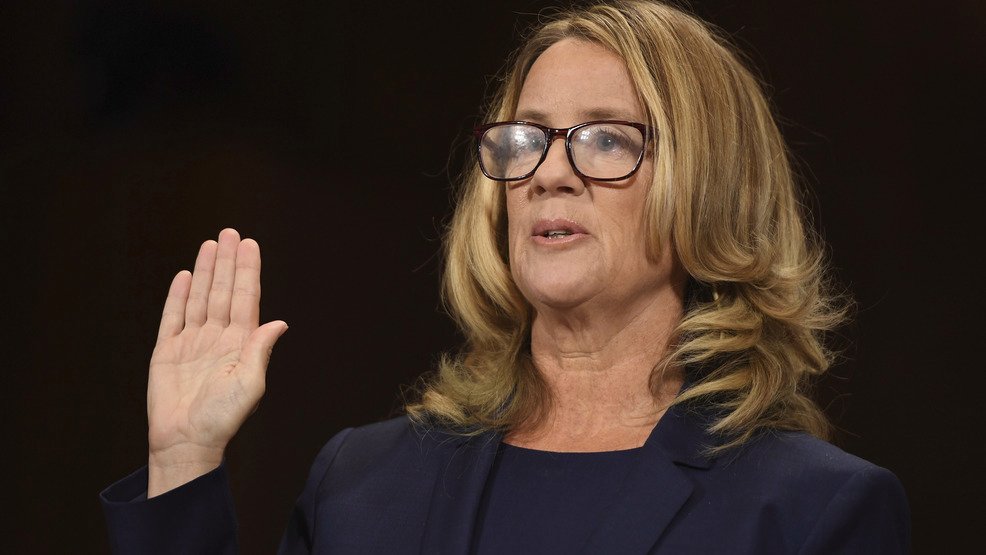Dr. Christine Blasey Ford being sworn in to testify before the Senate Judiciary Committee about Judge Brett Kavanaugh’s alleged history of sexual misconduct.
Judge Brett Kavanaugh is currently going through what may prove to be one of the most intense Supreme Court confirmation battles in American history. Just over two weeks ago, allegations that Kavanaugh committed or attempted to commit sexual assault in high school and college began to surface, bringing further controversy to the an already divisive nomination.
This week, the HPR’s Culture Board gathered to discuss the allegations, as well as broader questions about what bearing personal histories should have in the professional sphere. Emerging questions about Kavanaugh’s character have illuminated deep divides in Americans’ understandings of difficult questions about responsibility and justice. It is worth emphasizing that, while Kavanaugh is under scrutiny for sexual assault that allegedly occurred during his years in high school and college, no charges have been, or likely will be, brought against him in court. Arguments about the importance of due process and the presumption of innocence have featured heavily in discourse about the hearings, but these are concepts imported from the legal sphere, where the concern is that the accused will be wrongly imprisoned, not denied a promotion.
Members of the Board pointed out that this case is unique in multiple ways. Senate hearings are built into the Supreme Court nomination process to provide a check on a nominee’s morality and character, meaning that the standards for rejecting Kavanaugh should be relatively low compared to standards for conviction in the legal sphere. We do not need to believe, beyond reasonable doubt, that Kavanaugh committed violent acts of sexual assault. Much of the board agreed that even to be accused of such acts, and have those accusations corroborated, should be enough to reject the nomination.
A few members offered some qualifications or objections, though. We explored some of the standard Republican talking points in favor of approving Kavanaugh’s nomination, including the notion that Kavanaugh’s age at the time of the alleged assault might be a mitigating factor. Board members differed in their degrees of confidence in Christine Blasey Ford’s accusations, furthermore; some felt that the inherently private nature of the alleged assault precludes us from being able to firmly believe either story, but most were adamant that Ford’s story has plenty of evidentiary support and that she deserves to be believed. Ford told friends about the incident many years ago, and her therapist’s notes reveal that she discussed the event in counseling. Other accusations against Kavanaugh further discredit the foundation of his character and morals.
Whoever one is inclined to believe, the Kavanaugh controversy raises crucial questions about privacy in the Trump era. One board member argued that Donald Trump epitomizes Americans’ willingness to overlook personal discretions in political figures, and that perhaps this dynamic has extended to the Supreme Court. This is particularly concerning given the moral slant of the Supreme Court — justices’ ethical compasses are quite relevant to their abilities to decide on complex legal and social issues. Members of the board argued that the Kavanaugh allegations are particularly damning because morality is best interpreted in private settings when it seems like “nobody is watching.” Recent reports on Kavanaugh’s time at Yale paint a picture of a figure who engaged in immoral and misogynistic practices during his youth. The Ford allegations have forced Americans to ask who Kavanaugh is when the political spotlight is not on him, and the answers have been disturbing. We may never know with certainty who he was or what he did, but that doesn’t mean we shouldn’t use our best judgment to read the glaring signs from his past. The role of the Supreme Court justice straddles the line between legality and morality, and the accusations against Kavanaugh should leave us deeply hesitant about his moral standing. Shortly following our conversation, it was announced that the confirmation of Kavanaugh will be delayed for a week, giving senators a chance to continue exploring the accusations before they decide their vote. We sincerely hope that senators will, in good faith, listen to Kavanaugh’s accusers this week, and prioritize ethics over partisan division as they make a decision that will affect our country for decades to come. We feel the ultimate weight of history at this moment, and hope that the Senate will not repeat past mistakes. Having an alleged abuser on our nation’s highest court reflects poorly on our commitment to ethics in politics and sends a disturbing message to victims of sexual assault and abusers. The allegations against Kavanaugh are credible and his moral stature is questionable at best; he is not fit to serve as a Supreme Court justice, and the Senate should take reject the nomination.
This week’s CulturEd was written by staff writer Campbell Erickson. Members Mari Bothner, Alexandra Diggs, Nina Elkadi, Lauren Fadiman, Sophie Feldman, Savitri Fouda, Audrey Hansen, Noah Knopf, Sandra Ojeaburu, Trisha Prabhu, Russell Reed, and Katie Weiner contributed to the discussion.
Image Credit: Flickr/Ninian Reid
